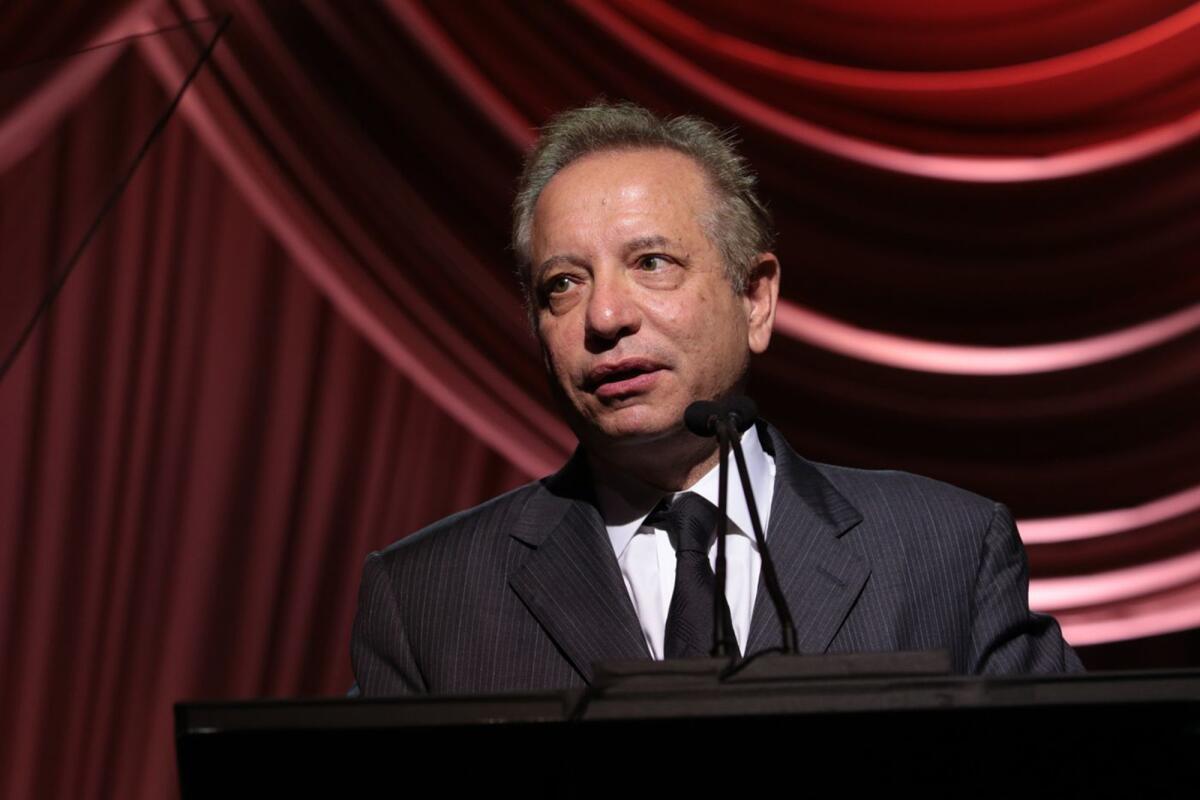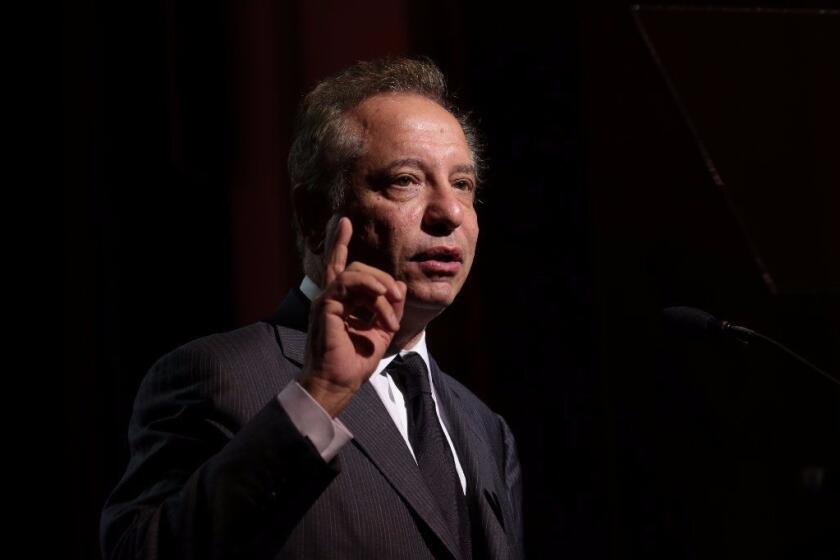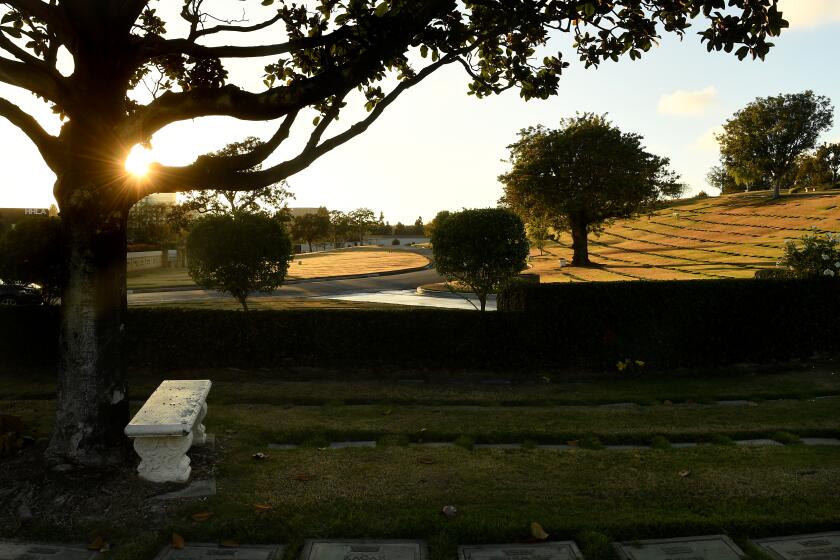A secret USC payout had a catch: Images of ex-dean using drugs had to be given up

- Share via
On a November day in 2017, USC entered into a secret mediation agreement with the family of a young woman whose drug-fueled relationship with the former dean of the university’s medical school had engulfed the institution in scandal.
Carmen Puliafito, who was dean of the Keck School of Medicine of USC during the relationship, was also a party to the agreement, which paid Sarah Warren, her brother and their parents a combined $1.5 million to head off a lawsuit by the family against him and USC, The Times has learned.
Confidential payouts to settle legal disputes are common, but one provision of the Warren pact was not, according to legal experts: To receive the money, family members had to turn over to USC all of their videos and photographs showing Puliafito using illegal drugs to allow the university to destroy them, two sources with knowledge of the agreement told The Times.
To comply with the agreement, the Warrens took their smartphones, computers and hard drives to a tech shop, where the devices were wiped clean of the videos and photos — some of which also showed him in sexual situations — along with any other material concerning Puliafito or USC, such as emails, text messages and letters, the sources said. The Times could not determine whether USC retained copies of the images and other material.
The deal, which forbids the Warrens from ever publicly discussing it or their dealings with Puliafito and USC, was struck as the #MeToo movement took hold across the country and highlighted criticism of financial settlements that silenced victims of sexual abuse and harassment.
The sources said the negotiations by lawyers for the Warrens, USC and Puliafito also took place around the time law enforcement was looking into Puliafito’s drug use and whether he provided drugs to others. Experts in civil and criminal law said it can be risky to destroy original videos, photos and other material amid an ongoing inquiry, depending on the intent of those signing the agreement.
No details of the agreement had been publicly disclosed until now.
The agreement was reached four months after a Times investigation disclosed Puliafito’s relationship with Warren and a circle of other young addicts and criminals. The terms were finalized the following January or February and noted that the Warrens were seeking damages from USC and Puliafito for his “alleged use of illegal narcotics” and “alleged illegal sexual contact” with Sarah Warren, the sources said.

Video of Dr. Carmen Puliafito, then-dean of the Keck School of Medicine of USC, in September 2015.
During its investigation of Puliafito’s drug use, the Medical Board of California obtained a large number of the videos and photos. It could not be determined whether the medical board acquired all of the images that were covered by the agreement and subsequently wiped from the Warrens’ devices.
The Times similarly could not determine whether the medical board had collected all the emails, text messages and other material cited in the agreement. A board spokesman declined to comment and did not answer questions about the images its investigators obtained or whether they knew about the agreement that allowed USC to destroy the images on the Warrens’ devices.
The settlement that muzzled the Warrens and had their devices wiped came after the university hired Debra Wong Yang, former U.S. attorney for Los Angeles, to conduct what she termed an “independent” investigation of the Puliafito scandal. Yang was among the USC signatories on a November “stipulation for settlement,” which was the basis of the agreement, the sources said.
Yang declined to comment. She and USC did not answer several written questions from The Times, including whether the university retained copies of the photos and videos or provided them to local, state or federal authorities.
Stanford Law School professor Robert Weisberg said it would be “somewhat tricky territory” to destroy images like those on the Warrens’ devices if the parties to an agreement weren’t certain that an investigative agency such as the medical board already had all of the material.
“A red flag pops up,” Weisberg said. “You’d have to prove that a reasonable person would have been legitimately convinced that the medical board had everything.”
If that wasn’t the case and USC hadn’t retained a copy, the university’s intentions could come under scrutiny, Weisberg and other experts said. California law makes it a misdemeanor for someone to destroy or conceal such material with the intent to prevent it from being “produced in evidence upon a trial, inquiry, or investigation, authorized by law.”
In USC’s lecture halls, labs and executive offices, Dr. Carmen A. Puliafito was a towering figure.
Alan Jackson, a former prosecutor in the Los Angeles County district attorney’s office, said that even if USC retained copies, it is “unseemly” for an institution to arrange for the destruction of the original material.
“You’re basically taking the evidence away from the victims,” Jackson said.
The agreement was negotiated while L.A. County sheriff’s detectives were investigating the October 2017 death of a newborn whose mother had a relationship with Puliafito. The inquiry focused on whether Puliafito gave the mother methamphetamine that was passed on to the baby in breast milk. Puliafito denied doing so, and the investigation closed in 2020 with no charges filed against Puliafito or the mother, Dora Yoder.
During its 2017 investigation of Puliafito, The Times obtained or reviewed many of the images in the Warrens’ possession. Several of those photos show Puliafito with Yoder, including in a Las Vegas hotel room with a meth pipe and butane torch in the foreground.
Sheriff’s Det. Mike Davis, one of the investigators in the newborn case, told The Times last month that he and his colleagues knew nothing about the arrangement to wipe the images from the Warrens’ devices.
“We had no information on that,” Davis said. “We were investigating a criminal case, and if there was evidence of said criminal activity we were investigating, I definitely would have been interested in seeing it.”
The sources said celebrity attorney Mark Geragos and his firm negotiated the deal for the Warren family.
Geragos and a member of his firm who signed the November stipulation declined to answer questions about the settlement terms. Puliafito also did not respond to The Times’ requests for an interview about the settlement.
The sources said the agreement also required the Warrens to provide a list of other people to whom they had given the images and material.
The other attorney who signed the November stipulation for USC was Carol Mauch Amir , then USC’s general counsel. She did not respond to interview requests. Former USC President C.L. Max Nikias, who was in office at the time and Amir’s boss, knew nothing about the destruction of the images and other material, his attorney said in an email to The Times.
“He has not seen USC’s settlement agreement with the Warren family nor does he have any knowledge regarding its specific contents,” the attorney, Stacy Harrison, wrote.
USC’s current president, Carol Folt, declined an interview request and did not answer written queries, among them whether she agreed with the criticism about settlements that silence accusers.
“These events happened years before President Folt arrived at USC; it would be inappropriate for her to comment,” a spokeswoman for Folt said in an email. When The Times noted that the part of the agreement silencing the Warrens remained in force, the spokeswoman replied, “We don’t have anything additional to add.”
The case of the death of newborn Boaz Yoder plunged detectives into the murky world of USC’s ex-medical school dean, Carmen Puliafito.
The Times’ investigation of Puliafito was published in July 2017. Warren had told the newspaper that she met Puliafito in early 2015 and that they were constant companions for more than a year and a half. She said Puliafito used drugs with her and sometimes brought her and other members of their circle to the USC campus after-hours to party.
Among the images The Times reviewed was a video of Puliafito inhaling from a large methamphetamine pipe. In a second video, Warren asks Puliafito to help her crush some meth in preparation to do a “hot rail,” a method of inhaling the drug. “Absolutely,” Puliafito says. Warren later bends over lines of white powder on a tray.
Another video shows Warren and Puliafito “shotgunning” meth — she takes a hit from a pipe and as she exhales, Puliafito sucks in the smoke that streams from her mouth. A photo time-stamped 3 a.m. shows a convicted drug dealer named Kyle Voigt and Warren in Puliafito’s office at Keck.
His drug use continued even after Warren overdosed in his presence in a Pasadena hotel room and he was forced from his dean’s post in March 2016.
The Harvard-educated ophthalmologist later testified at a Medical Board of California hearing that he used meth and heroin with Warren. She told The Times that Puliafito had a daily drug habit for most of the roughly 20 months they were together.
The medical board presented some of the images as evidence at the hearing in the Puliafito case, which resulted in the revocation of his physician’s license.
The man who called for an ambulance at an Altadena apartment last fall had the calm and direct manner of one familiar with healthcare emergencies.
The stipulation for a settlement between USC and the Warrens was reached a few weeks after the district attorney’s office issued an internal document assessing whether felony charges should be filed against Puliafito, including for allegedly providing drugs to Warren’s younger brother, Charles, when he was a minor. The assessment was based on the medical board investigation.
Deputy Dist. Atty. Mark Burnley wrote in the document, known as a charge evaluation worksheet, that “the current state of the case does not establish sufficient evidence to prove the charges beyond a reasonable doubt.”
The chief investigator in the medical board inquiry refused to sign Burnley’s memo, according to an email exchange between the prosecutor and the state attorney general’s office that The Times recently obtained under the California Public Records Act.
Carmen Aguilera-Marquez said last month in a Times interview that the district attorney’s office “did a good job reviewing the case,” and she noted there is a higher standard of proof in criminal cases than in medical board proceedings. Nevertheless, she disagreed with the decision not to prosecute Puliafito.
“I feel there should have been charges filed,” Aguilera-Marquez said. “They have their opinion and we have our different opinion.”
She declined to discuss the images or the other evidence.
Burnley declined to comment.
Former Los Angeles County Dist. Atty. Jackie Lacey, who was in office at the time, said in a recent interview that she was unaware of the settlement agreement and the wiping of the images and other material. “That should be looked into,” Lacey said.
In the case of the newborn, Boaz Yoder, Puliafito paid the rent on Dora Yoder’s Altadena duplex, where the baby died. After a coroner’s toxicology test found traces of meth in the 25-day-old boy’s blood, the detectives embarked on a lengthy investigation into whether Puliafito was the source of the meth. Puliafito testified at the medical board hearing that he never provided any drugs to Yoder or used drugs with her.
Sarah Warren had told The Times that she witnessed Puliafito giving Yoder meth numerous times in 2015 and 2016, before Yoder was pregnant.
According to Warren, the photos that show Puliafito and Yoder in the Las Vegas hotel were taken in 2015. Warren and Yoder’s boyfriend are also in the photos. Warren previously told The Times that the group smoked meth on that occasion.
Warren said she lost contact with Yoder before her pregnancy.
Yoder did not respond to interview requests.
Her sister, Miriam Jones, said Dist. Atty. George Gascón should investigate the matter. “There should be accountability for this,” she said.
John Manly, an Orange County attorney who negotiated an $852-million settlement with USC in the sex abuse case involving campus gynecologist George Tyndall, agreed.
Manly said he would not have allowed his clients in the Tyndall case to enter into an agreement that resulted in them giving up material like the photos and videos in the Puliafito matter — in part because the same material could be useful in a future lawsuit.
“Who does that?” Manly said. “There could be other victims out there.”
A spokesman for Gascón did not respond to a request for comment.
UC Hastings law professor Richard Zitrin had helped draft legislation limiting the use of gag orders and other types of secrecy in legal settlements. One bill to which he contributed outlawed secrecy pacts in sexual abuse cases.
“The downside to secrecy is its effect on others,” said Zitrin, who echoed Manly’s point about the possibility of more victims coming forward. “It should be unethical for a lawyer to do this.”
More to Read
Sign up for Essential California
The most important California stories and recommendations in your inbox every morning.
You may occasionally receive promotional content from the Los Angeles Times.
















